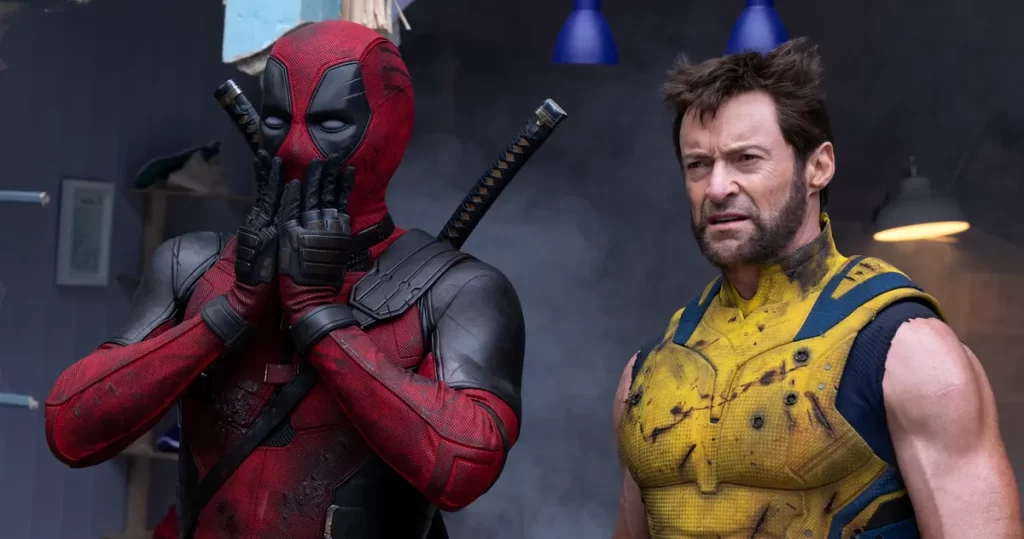
Superhero movies invariably deal with threats to the world, but what’s really in peril in Deadpool & Wolverine is the Marvel Cinematic Universe itself. “Welcome to the MCU, by the way. You’re joining at a bit of a low point,” Wade Wilson (Ryan Reynolds) says to Logan (Hugh Jackman), implicitly bemoaning the underwhelming grosses of recent efforts like The Marvels and Ant-Man and the Wasp: Quantumania. As a costumed savior, Wade’s track record is spotty—his application was rejected by both the Avengers and the X-Men—but as a box-office analyst, his assessment is hard to argue with. That’s why his mission in his newest picture is less cosmic than commercial: He must salvage the MCU’s viability as an ongoing franchise, even as he constantly mocks its quality and lampoons its conventions.
And I do mean constantly. Scarcely a scene passes in Deadpool & Wolverine in which Wade, whether bobbing his head in his trademark red mask or turning to the camera with his heavily burned face, doesn’t deliver a knowing quip concerning behind-the-scenes shenanigans. Why, after having seemingly retired the character in Logan, is Jackman returning to play everyone’s favorite clawed mutant? “A big bag of Marvel cash.” Why did the X-Force bite the dust in Deadpool 2? “The police say gravity, but just between you and me, they didn’t test well in the focus group.” What is Wade’s conception of his own superheroic destiny? “I’m Marvel Jesus… suck it, Fox!” (After that last one, he literally headbutts the camera.) Forget the comic-book brand immortalized by Stan Lee; the MCU is now the Meta Cinematic Universe.
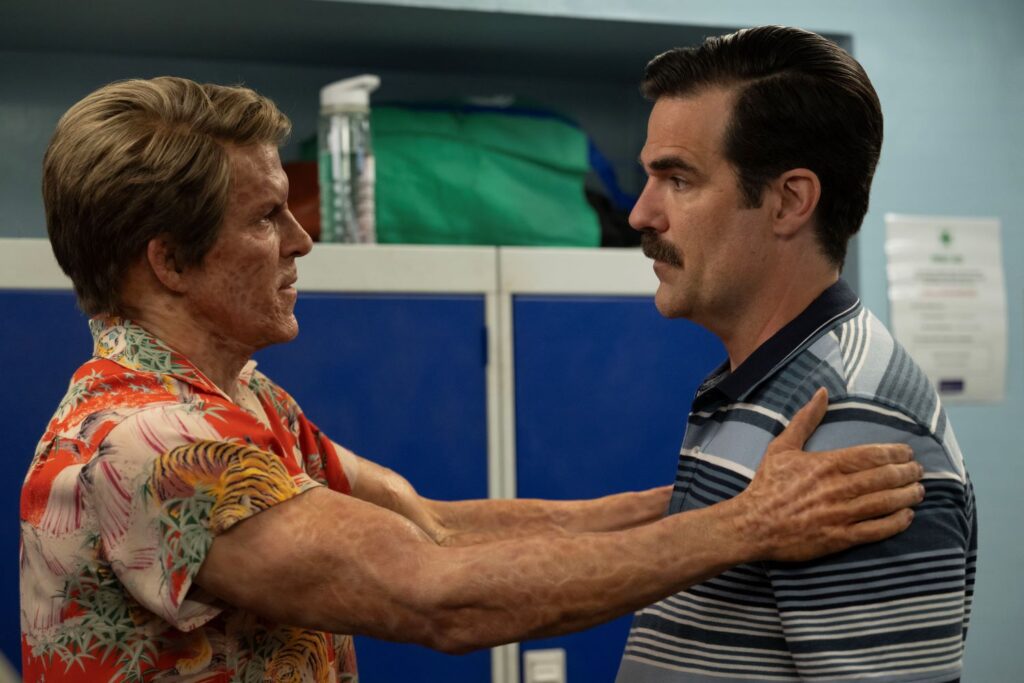
Zoom out far enough, and you can appreciate Deadpool & Wolverine’s commitment to the bit. As you’re continually reminded by the screenplay—which is hilariously credited to five writers, including Reynolds, presumably to account for all of the improv on display—Deadpool was a Fox property who now serves under the four-quadrant aegis of the Walt Disney Company. What should prove an awkward fit—shoehorning Reynolds’ foul-mouthed, scatologically explicit, libido-fueled sense of humor into the kid-friendly confines of the Mouse House—instead becomes the movie’s raison d’être. “Pegging isn’t new for me, friendo, but it is for Disney,” Wade tells some baton-wielding officers before giving a Halpertian glance to the camera. The film’s central joke—arguably its only joke—is that it’s fucking the hand that feeds it.
Is this funny? It can be; certainly audiences seem to have responded favorably, given that Deadpool & Wolverine is currently Hulk-smashing box office records. In its post-credits scene (which, whatever, spoiler warning I guess), a golden-boy actor unleashes a furiously profane, anatomically graphic tirade where he fantasizes about murdering and defiling the picture’s villain—“I won’t be happy until I’ve urinated on her freshly barbecued corpse and husk-fucked the charred remains”—after which the standard “Distributed by the Walt Disney Company” card appears on screen. At my showing, as I filed out alongside the countless other patrons who’d stayed until the very end, a woman remarked, “It’s a Disney movie, that’s the funniest joke of all.”
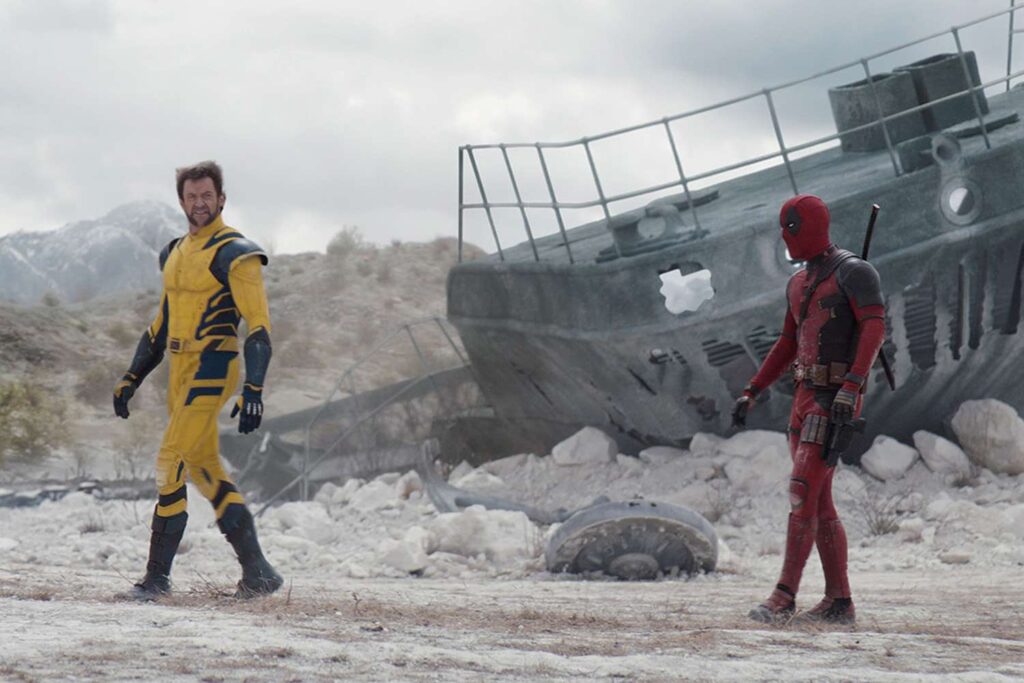
To paraphrase a different MCU titan: Is it though? I don’t deny sporadically laughing during Deadpool & Wolverine, such as when the characters are shunted into a purgatorial realm called The Void and encounter a giant, ruined model of the 20th Century Fox logo, like the statue at the end of Planet of the Apes. The script’s (OK, the filmmakers’—who knows how much of this shit was actually written down) high-volume approach to attempted zingers ensures that a decent number of one-liners land—I chuckled at Wade’s description of a self-pleasuring practice called “smashturbating”—even if the hit quotient is rather low. Yet while the movie postures itself as transgressive, its ultimate attitude is one of smugness. You can sense it congratulating itself with every curse word, every comic-book reference, every arch aside—we’re making fun of Marvel flicks, ha! It pretends to be skewering mass consumerism, but it’s really just providing another form of fan service, rewarding its disciples for dutifully tracking all of the MCU’s developments, both on screen and off. It might as well be titled Avengers: Age of Put-On.
As with its predecessors, Deadpool & Wolverine tries to have it both ways, manufacturing its own epic superhero adventure even as it repeatedly ridicules the concept of epic superhero adventures. To that end, its cockamamie plot bizarrely incorporates elements from the TV series Loki, in particular its Time Variance Authority (don’t ask), which is now headed (sort of) by an oily suit played with patrician arrogance by Matthew Macfadyen. Following some multiversal mumbo-jumbo (cue Wade observing that “the multiverse thing has been miss after miss”), Wade determines that he must team up with Logan in order to save some world or another. This leads to a brisk montage—which is of course prefaced by Wade shouting, “Cue the fucking montage, baby!”—in which Wade visits various timelines in search of the proper Logan (including a bulky variant played by Henry Cavill, dubbed “The Cavillrine”) before settling on an especially surly version; at that point, our mismatched mutants get banished into the Void, a Mad Max-style wasteland (“That would be IP infringement”) that’s lorded over by a bald villainess (Emma Corrin).
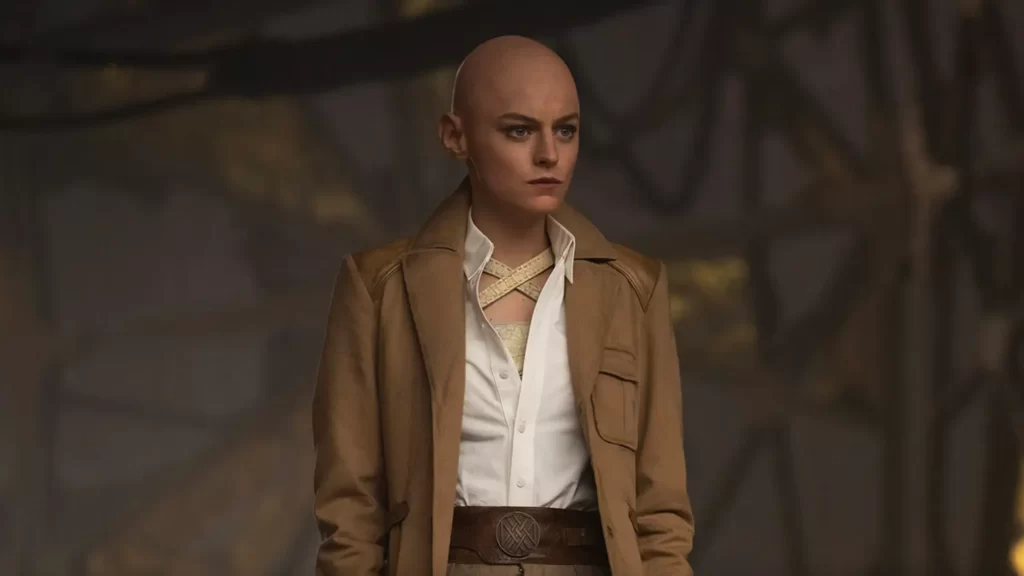
The logistical details of these narrative machinations are irrelevant. What matters is that Wolverine has finally joined the MCU (and he’s wearing his yellow leotard from the comics, hooray!), and his snarling lethality is juxtaposed against Deadpool’s smirking impudence. The ostensible pleasure of Deadpool & Wolverine lies right there in its title; surely even the most curmudgeonly, anti-fun critic will enjoy seeing these two superheroes share the screen, trading punches and F-bombs. What they do pales in comparison to who they are.
In fairness, Deadpool & Wolverine doesn’t just coast on its own premise. The mile-a-minute dialogue is rarely witty, but it is busy, and the broader movie is too frenetic—too eagerly sating your appetite for pop-culture landmarks—to be lazy. To the contrary, it’s positively glutted, loading up on plot hijinks and CG-heavy set pieces and self-satisfied cameos. It’s as if Reynolds and Shawn Levy, the film’s credited director, feared that any lapse in frantic activity would result in the exposure of their exhausting shell game.
I say “credited” because Levy, who also shepherded Reynolds through the winking Disney vehicle Free Guy, operates less as a director than a steward, guiding the proceedings to ensure that his leading man’s digressive antics are backed by a threshold level of visual competence. Deadpool & Wolverine may frame itself as mischievously removed from its costumed brethren, but aside from a marginal increase in gore—which generally manifests in the form of blades piercing a victim’s genital area, followed by a painful grunt—its mayhem resembles that of a generically lousy Marvel picture, with little aesthetic style or imagination. The exception arrives near the end, with a spiffy tracking shot that dollies alongside the action as our masked madmen carve their way through dozens of anonymous foes, but even here the combat is too weightless to be viscerally exciting.
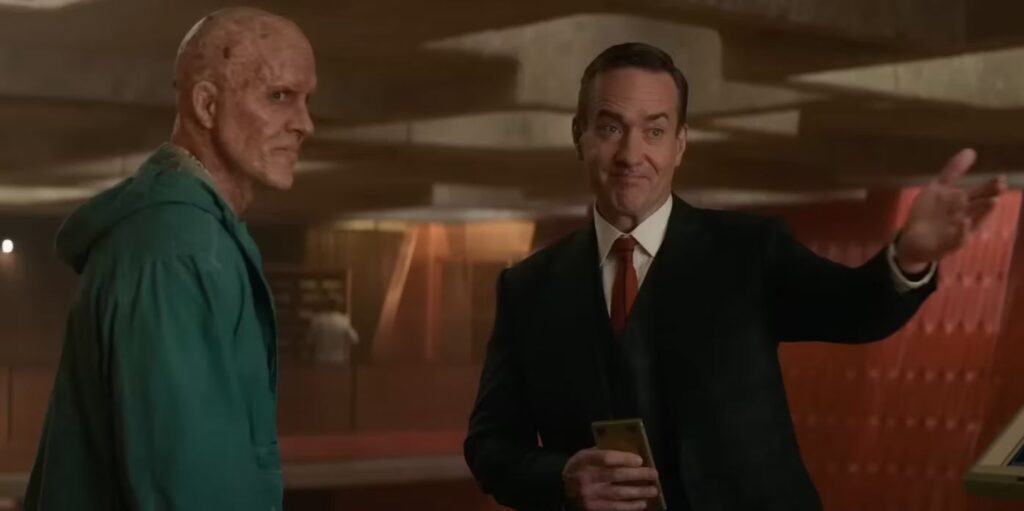
This too, of course, is beside the point, as is Jackman’s passably growly performance; despite the title allocating equal weight, the animating spirit of Deadpool & Wolverine remains Reynolds’ persistent impishness. Three installments in, the actor has weaponized his geniality into a strong-arm tactic, bullying you into applauding his filthy stream of consciousness, and there’s now something vaguely egotistical about his front-and-center smarm. Remember how Deadpool 2’s opening credits billed Reynolds as someone who “didn’t want to share the spotlight”? Here, when Wade barks “Bitch, are you improv-ing?” at a party guest, it’s fair to wonder if we’re watching an A-lister snap at a bit player in real time.
The movie’s response, naturally, is to give us even more Ryan Reynolds. The chief irony of the Deadpool series is that it cast an impossibly handsome person in the role of a burn victim whose face is either disfigured or camouflaged. Deadpool & Wolverine occasionally corrects this issue by bringing in a different Deadpool—he’s credited as Nicepool, though our Wade derisively refers to him as “Van Milder”—whose skin is unblemished and whose beautiful visage remains visible. (He comes toting Dogpool, a long-tongued pug/Chinese Crested mix who’s “90% G-spot,” make it stop.) At one point, this alternate-universe Wade tells his counterpart that he’s equally capable of breaking the fourth wall before turning to the camera and saying, “The Proposal.” Nothing *about* The Proposal, mind you; the joke is simply that a Ryan Reynolds character is breaking the fourth wall, which annoys a second Ryan Reynolds character whose whole shtick is breaking the fourth wall.
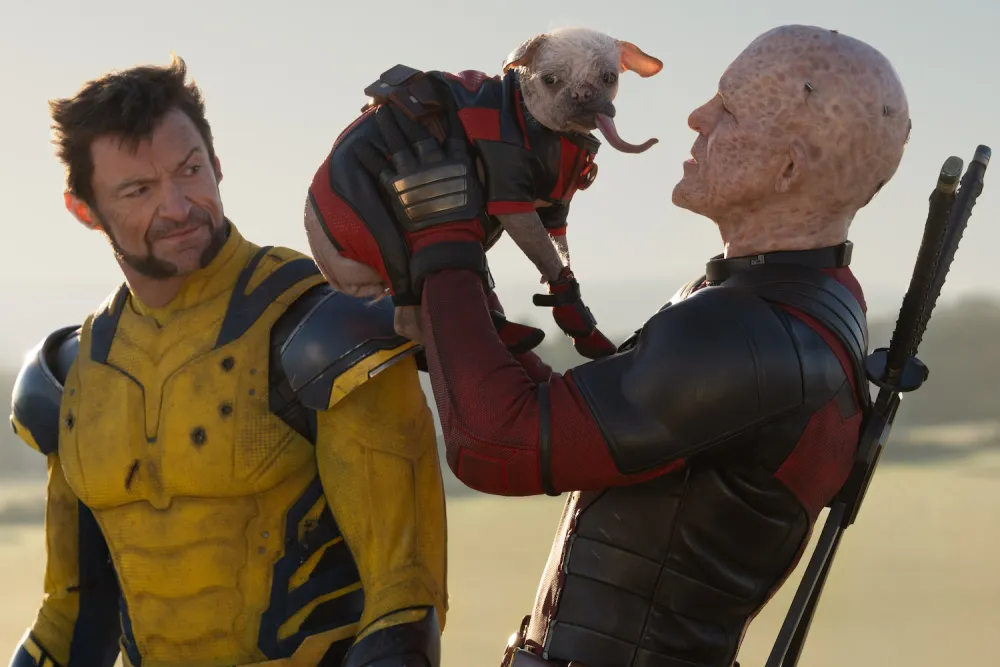
Perhaps it’s silly to complain about the comic emptiness of all of this, given that Deadpool & Wolverine is happily smirking all the way to the bank. Yet its faux ingratiating method strikes me as less playful than pernicious. Why bother making a specifically interesting superhero movie, it argues, when you can just make fun of superhero movies in general? The MCU is a perfectly valid target for satire, but Reynolds and Levy are too proud of themselves—too preoccupied with piling up references and accumulating easter eggs—to lend their purported acerbity any real bite. (When Wade asks a thickly accented character, “Who’s your dialect coach, the Minions?” it’s mildly amusing; when he follows that with “I feel like we’re missing crucial exposition here,” he’s just layering one feeble meta joke atop another.) The film fancies itself a grenade lobbed from inside the Mouse House, but it’s too childish to be explosive.
But maybe that’s the whole point. For all its postmodern gags and bloody dismemberments and puerile provocations (“Sorry, I don’t have much vaginal sex”), Deadpool & Wolverine doesn’t want to blow up the MCU; it wants to expand it. My screening was preceded by a trailer for Captain America: Brave New World, the studio’s upcoming attempt to both reboot a beloved character and recapture the fans who abandoned the franchise in the wake of the Avengers saga. No doubt Deadpool & Wolverine would consider itself superior to such a straitlaced comic-book adaptation, but its primary function is the same—to be a product, another piece of content churned out by the Marvel machine. That’s the most depressing joke of all.
Grade: C-
Jeremy Beck is the editor-in-chief of MovieManifesto. He watches more movies and television than he probably should.
